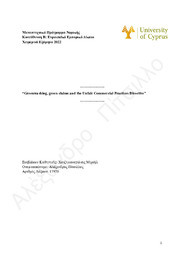Greenwashing, green claims and the Unfair Commercial Practices Directive

View/
Date
2022-01-12Author
Pitsillos, AlexandrosPublisher
Πανεπιστήμιο Κύπρου, Σχολή Κοινωνικών Επιστημών και Επιστημών Αγωγής / University of Cyprus, Faculty of Social Sciences and EducationPlace of publication
CyprusGoogle Scholar check
Keyword(s):
Metadata
Show full item recordAbstract
Στις μέρες μας, οι καταναλωτές παρουσιάζονται συχνά με διαφημίσεις για "πράσινα" προϊόντα και βιώσιμες εναλλακτικές λύσεις. Ωστόσο, πολλά από αυτά τα προϊόντα μπορεί να μην είναι τόσο φιλικά προς το περιβάλλον όσο ισχυρίζονται οι εταιρείες που τα διαφημίζουν. Αυτή η παραπλανητική πρακτική, γνωστή ως greenwashing, είναι ένα αυξανόμενο φαινόμενο όπου οι εταιρείες υπερβάλλουν ή παραπλανούν τους καταναλωτές ώστε να λάβουν αγοραστικές αποφάσεις που κανονικά δεν θα έπαιρναν. Για την καταπολέμησή του, η Ευρωπαϊκή Ένωση έχει εφαρμόσει ένα νομικό πλαίσιο, συγκεκριμένα την οδηγία 2005/29/ΕΚ (οδηγία για τις αθέμιτες εμπορικές πρακτικές), για την προστασία των καταναλωτών από παραπλανητικούς "πράσινους" ισχυρισμούς. Τα άρθρα 6, 7 και 12 της οδηγίας προσφέρουν κάποιο βαθμό προστασίας των καταναλωτών από ψευδείς και παραπλανητικούς ισχυρισμούς. Ωστόσο, πρέπει να γίνει περισσότερη δουλειά και να εφαρμοστούν πρόσθετοι κανόνες για την παροχή ισχυρότερης προστασίας των καταναλωτών. Διάφορες λύσεις και τροποποιήσεις θα μπορούσαν να συμβάλουν στην αντιμετώπιση του προβλήματος, αλλά απαιτείται ταχεία δράση για την αποτελεσματική αντιμετώπιση του ζητήματος. Η παρόν εργασία ασχολείται με το ζήτημα του greenwashing, των αθέμιτων εμπορικών πρακτικών και της διασύνδεσής τους. Επικεντρώνεται συγκεκριμένα στην υφιστάμενη νομοθεσία που προσφέρει ένα ορισμένο επίπεδο προστασίας στους καταναλωτές έναντι αυτών των πρακτικών. Ο κύριος στόχος της εργασίας είναι να εξετάσει τη σχέση μεταξύ του greenwashing και των αθέμιτων εμπορικών πρακτικών και να προβεί σε μια ολοκληρωμένη ανάλυση του υφιστάμενου επιπέδου προστασίας των καταναλωτών. Επιπλέον, η εργασία αποσκοπεί στο να προτείνει πιθανά μέτρα που θα μπορούσαν να ενισχύσουν την προστασία των καταναλωτών από την άποψη αυτή. Nowadays, consumers are frequently presented with advertisements for "green" products and sustainable alternatives. However, many of these products may not be as environmentally friendly as claimed by the companies advertising them. This deceptive practice, known as greenwashing, is a growing phenomenon where corporations exaggerate or mislead consumers to make purchasing decisions they wouldn't normally make. To combat this, the European Union has implemented a legal framework, specifically Directive 2005/29/EC (the Unfair Commercial Practices Directive), to protect consumers from misleading "green" claims. Articles 6, 7, and 12 of the directive offer some degree of consumer protection against false and misleading claims. However, more work needs to be done and additional rules must be implemented to provide stronger consumer protection. Various solutions and amendments could help address this problem, but swift action is necessary to effectively tackle the issue. This paper addresses the issue of greenwashing, unfair commercial practices, and their interconnection. It specifically focuses on the existing legislation that offers a certain level of protection to consumers against these practices. The main goal of the paper is to examine the relationship between greenwashing and Unfair Commercial Practices and to conduct a comprehensive analysis of the current level of consumer protection. Furthermore, the paper aims to propose potential measures that could enhance consumer protection in this regard.
In its conclusion, this paper explains that the greenwashing phenomenon has global implications all around the world and highlights how consumers are increasingly uncertain about environmentally friendly products, leading to heightened skepticism. Companies risk losing their competitive edge if they genuinely attempt to be eco-friendly. Scholars, including TerraChoice, Lyon, and Montgomery, have identified various greenwashing techniques, fostering consumer doubt and suspicion towards businesses. The negative consequences of greenwashing extend beyond consumers, affecting corporations and potentially impeding genuinely beneficial environmental innovations.
As organizations strive to establish an environmentally friendly image, it is essential that anti-greenwashing measures demonstrate adaptability and flexibility. Despite the Unfair Commercial Practices Directive (UCPD) being a crucial legal instrument, its fragmented approach poses challenges. The issues explored in this paper with the help of different sources like books, article online reports, press releases, case law and online articles underscore the necessity of a revamped legal framework, as evidenced by the 2021 website screening revealing insufficient consumer protection against greenwashing. Nonetheless, positive strides have been made at the national level, with cases such as Volkswagen, Superfos, and Italian demonstrating recognition of the greenwashing issue and corresponding measures taken. The European Commission has finally taken action by proposing an amendment to the UCPD, emphasizing consumer protection against greenwashing. Furthermore, organizations like the BEUC have offered ideas to address the problem, signaling a growing awareness within the European Union. This signifies a promising start in the fight against greenwashing, although further adjustments may be required in the future.
